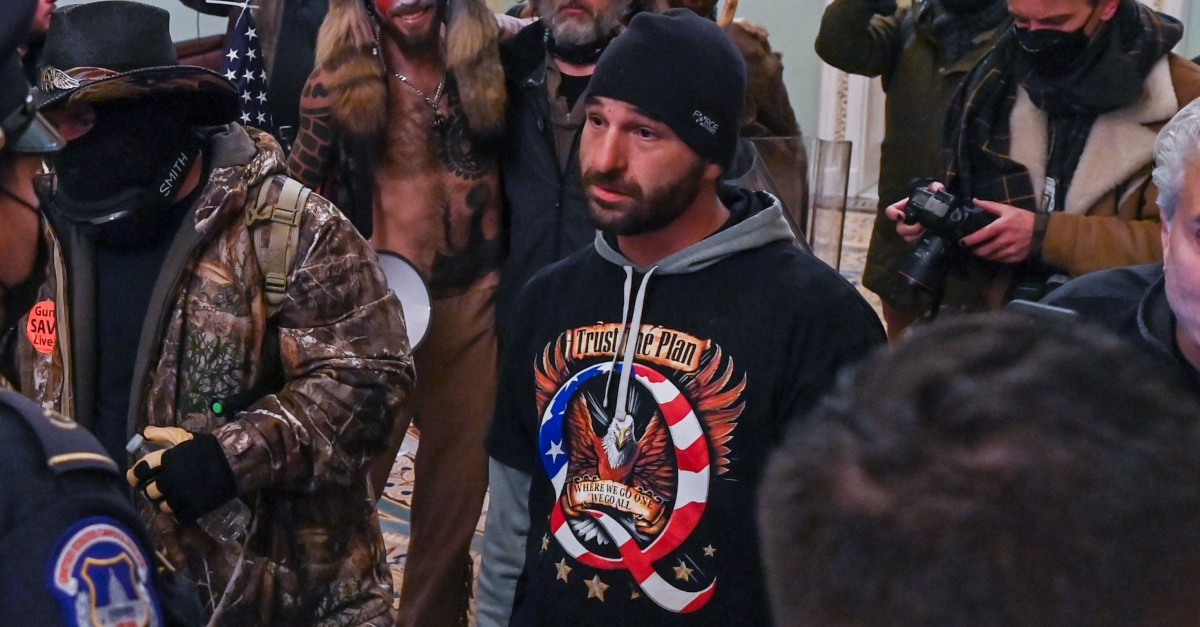
Doug Jensen, wearing QAnon shirt inside the Capitol.
An accused member of the pro-Trump group who stormed the U.S. Capitol Complex earlier this year is asking a federal judge to treat his consumption of far-right content online like a drug dependency case.
Iowa man and QAnon adherent Douglas Jensen–famous for believing that he was “touching the fucking White House” when he was, in fact, touching the U.S. Capitol–was released from jail in July.
U.S. District Judge Timothy J. Kelly reasoned that because the defendant had “no basic understanding of where he even was that day,” home confinement would likely ensure his attendance at trial.
There were, however, additional release conditions. One of those conditions was a prohibition on the use of any electronic device that can access the internet. Jensen admittedly violated that condition within 30 days of being released from jail–after previously spending several months in lockup following his Jan. 10 arrest.
On Aug. 13, a pretrial services officer allegedly discovered Jensen in his Des Moines garage listening to the news on a far-right video-sharing website akin to YouTube, the government claimed.
“When confronted about this obvious violation of his release conditions, defendant provided his Pretrial Services Officer with one excuse after another,” Assistant U.S. Attorney Hava Arin Levenson Mirell claimed in a motion to revoke pre-trial release. “First, he claimed that the phone belonged to his daughter. Jensen’s daughter, however, later told Pretrial Services that she had gotten a new phone almost three weeks ago. Then, Jensen claimed that his wife – the same individual who swore, under oath, to notify the Court immediately if Jensen violates a condition of release – facilitated his violation by leaving the news on for him when she left for work in the morning. Finally, Jensen claimed not to know the password to the iPhone, only to later enter the password for his Pretrial Services Officer.”
The government alleged that the defendant himself later admitted he was watching a “Cyber Symposium regarding the recount of the presidential election” by MyPillow CEO Mike Lindell.
“Jensen’s swift violation confirms what the Government and this Court suspected all along: that Jensen’s alleged disavowal of QAnon was just an act; that his alleged epiphany inside the D.C. Jail was merely self-advocacy; and that, at the end of the day, Jensen will not abandon the misguided theories and beliefs that led him to menacingly chase U.S. Capitol Police Officer Eugene Goodman up the Senate staircase on January 6, 2021,” Mirell said last week.
On Sunday, Jensen formally fessed up to it all.
“Mr. Jensen concedes that he was in violation of his pre-trial release conditions by accessing program(s) being streamed from the internet,” the response motion from attorney Christopher M. Davis began. “Though his wife may have been less than clear on the distinction between ‘direct versus indirect’ access to the internet, Mr. Jensen knew that this was not allowed and is prepared to accept the consequences of his actions.”
The defense clarified that the borrowed iPhone being used to stream Lindell content to a BlueTooth radio “was in fact an iPhone his daughter had been using” and was going to be returned to its rightful owner “on the evening of the day it was seized.”
The filing went on to explain that “Jensen had been working in the yard that week, cutting down a large tree” and that such work “was exceptionally hot.” Afterward, the narrative noted, “he would go into the garage to cool down” and “listen to the radio.”
Jensen’s defense attorney also said that every other condition of release has been complied with and readily conceded that “his urge to access the internet will be a topic of discussion” during a mental health evaluation currently slated for Aug. 27. Davis then asked the court not to jail Jensen, but instead to treat this use-of-internet violation like a drug relapse.
“Mr. Jensen asks this Court to give him another chance,” the filing concluded. “He will comply with his release condition to be evaluated and will further comply with any recommended mental health treatment plan. He asks this Court to consider imposing a sanction short of revocation and incarceration pending trial. If a drug abuser relapses, there is typically a sanction protocol in place to help the person deal with his/her substance abuse issues. Mr. Jensen requests that this Honorable Court treat his violation is a similar manner.”
[Image via SAUL LOEB/AFP via Getty Images]